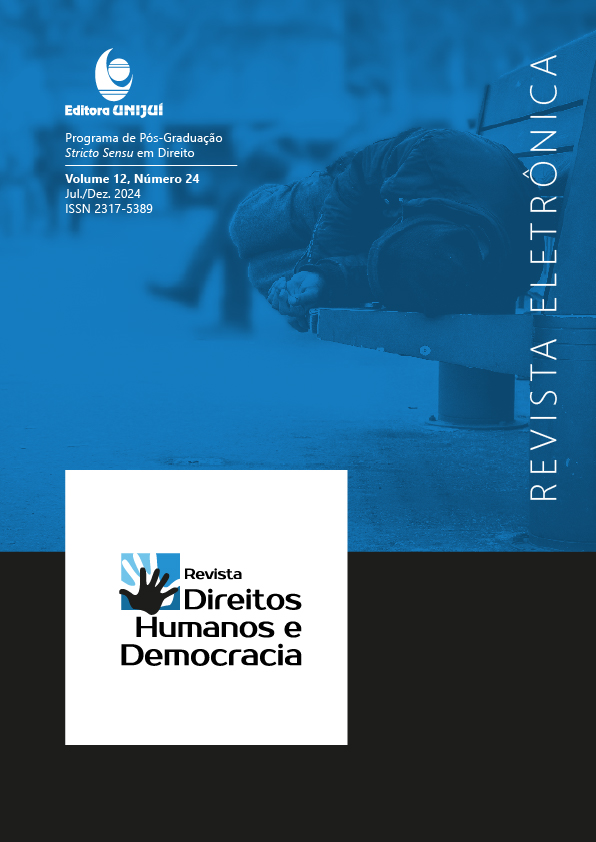The legal-educational empowerment of black women and equal access to decision-making positions within the brazilian judiciary
DOI:
https://doi.org/10.21527/2317-5389.2024.24.16219Keywords:
Access to education, Popular education, Black women, JudiciaryAbstract
The present work is based on data indicating the lack of representation of black women in teaching positions in higher education courses in Law and Legal Sciences. Therefore, the general objective is to analyze the possible impacts of popular legal education, aiming to encourage the training of black women, for equal access to decision-making positions in the Brazilian Judiciary. The problem lies in the following question: to what extent does the lack of representation in the Brazilian Judiciary and in legal teaching positions in higher education serve as stimulating factors to rethink popular legal education, aiming to encourage the training of black women, contributing to equal access to decision-making positions in the Brazilian Judiciary? The methodology includes the deductive approach method, and the research techniques used will be bibliographic and documentary research. It can be concluded, preliminarily, that the low representation of women in higher education teaching, especially in the graduation of future law graduates and in positions within the Judiciary, occurs due to a lack of encouragement, associated with a gap in popular education and the training of these black girls and women, so that there is a new structuring of the Judiciary through access to education.
References
AGÊNCIA SENADO. Disponível em: https://www12.senado.leg.br/radio/1/noticia/2023/06/22/debatedores-pedem-ajustes-no-modelo-do-novo-ensino-medio. Acesso: 12 jul de 2024.
BRASIL. Constituição (1988). Constituição da República Federativa do Brasil: promulgada em 5 de outubro de 1988.
BRASIL. Lei nº 9.394, de 20 de dezembro de 1996. Estabelece as diretrizes e bases da educação nacional. Disponível em: https://www.planalto.gov.br/ccivil_03/leis/L9394compilado.htm. Acesso em: 27 jul de 2024.
Conselho Nacional de Justiça (CNJ). Resultados parciais do censo do Poder Judiciário 2023 : relatório / Conselho Nacional de Justiça. – Brasília: CNJ, 2023.
EDUCAÇÃO no Brasil: as principais políticas públicas das últimas três décadas. Fundação Fernando Henrique Cardoso, São Paulo, junho, 2021. Disponível em: https://fundacaofhc.org.br/linhasdotempo/educacao/. Acesso em: 19 jul de 2024.
FREIRE, Paulo. A mensagem de Paulo Freire: teoria e prática da libertação. Porto Alegre: Nova Crítica, 1979.
GARGARELLA, R. La revisión judicial en democracias defeituosas. Revista Brasileira de Políticas Públicas, Brasília/DF, v. 9, n. 2, 2019, p. 152-167.
GRUPO DE TRABALHO DA SOCIEDADE CIVIL PARA A AGENDA 2030. VII Relatório Luz da Sociedade Civil da Agenda 2030 de Desenvolvimento Sustentável. Disponível em: https://gtagenda2030.org.br/wp-content/uploads/2023/10/rl_2023_webcompleto-v9.pdf. Acesso: 19 jul de 2024.
INSTITUTO NACIONAL DE ESTUDOS E PESQUISAS EDUCACIONAIS ANÍSIO TEIXEIRA (INEP). Censo da Educação Superior 2022 : divulgação dos resultados / Instituto Nacional de Estudos e Pesquisas Educacionais Anísio Teixeira – Brasília: INEP, 2023.
MAGALHÃES, Daniel Alves. A Filosofia Pragmatista na Educação Popular. 2008. 242 f. Tese (Doutorado em Educação) - Universidade Federal da Paraí¬ba, João Pessoa, 2008.
MORAGA, Cherríe. “It’s the Poverty”. In: Loving in the War Years: Lo que nunca pasó por tus lábios. Boston: South End Press. 1983.
RAZETO, Luis. Educación popular y desarollo local. In: VARGAS, Jorge Osório. Educación de adultos y democracia. Peru: Tarea, 1990, pp. 105-127.
RIBEIRO, Vera Maria Masagão et al. Metodologia da alfabetização: pesquisa em educação de jovens e adultos. Campinas: Papirus; São Paulo: CEDI, 1992.
RODRIGUES NETO, Antônio; NOZU, Washington Cesar Shoiti; ROCHA, Ana Cláudia dos Santos. Direito à educação cidadã: reflexões sobre o programa escola sem partido. Educação em Revista, Marília, v. 20, p. 83-98, 2019. Disponível em: https://revistas.marilia.unesp.br/index.php/educacaoemrevista/article/view/9374. Acesso em: 27 jul de 2024.
AUTOR; WERMUTH, Maiquel Ângelo Dezordi. O ensino jurídico no Brasil e a aposta na pedagogia da pacificação: um paradigma não violento é possível? Revista Quaestio Iuris, v.16, p.2247- 2266, 2023.
STANGHERLIN, Camila; AUTOR. O direito fraterno e a educação jurídica: contribuições para a recontextualização de uma estrutura curricular mais humanizante. Revista Jurídica da Fa7, v.18, p.75 - 86, 2021.
VARGAS, Jorge Osório. Educación de Adultos y democracia. Lima: Tarea, 1990.
Downloads
Published
How to Cite
Issue
Section
License
Copyright (c) 2024 Human Rights and Democracy Journal

This work is licensed under a Creative Commons Attribution 4.0 International License.
By publishing in the Revista Direitos Humanos e Democracia, authors agree to the following terms:
Articles are licensed under the Creative Commons Atribuição 4.0 Internacional (CC BY 4.0), which allows:
Share — copy and redistribute the material in any medium or format;
Adapt — remix, transform, and build upon the material for any purpose, including commercial use.
These permissions are irrevocable, provided the following terms are respected:
Attribution — authors must be properly credited, with a link to the license and indication of any modifications made;
No additional restrictions — no legal or technological measures may be applied that restrict the use permitted by the license.
Notices:
The license does not apply to elements in the public domain or covered by legal exceptions.
The license does not grant all rights required for specific uses (e.g., image rights, privacy, or moral rights).
The journal is not responsible for opinions expressed in the articles, which remain the sole responsibility of the authors. The Editor, with the support of the Editorial Committee, reserves the right to suggest or request modifications when necessary.
Only original scientific articles presenting research results of interest, not previously published or simultaneously submitted to another journal with the same purpose, will be accepted.
References to trademarks or specific products are intended solely for identification purposes and do not imply any promotional endorsement by the authors or the journal.
License Agreement: Authors retain copyright over their articles and grant the Revista Direitos Humanos e Democracia the right of first publication.













